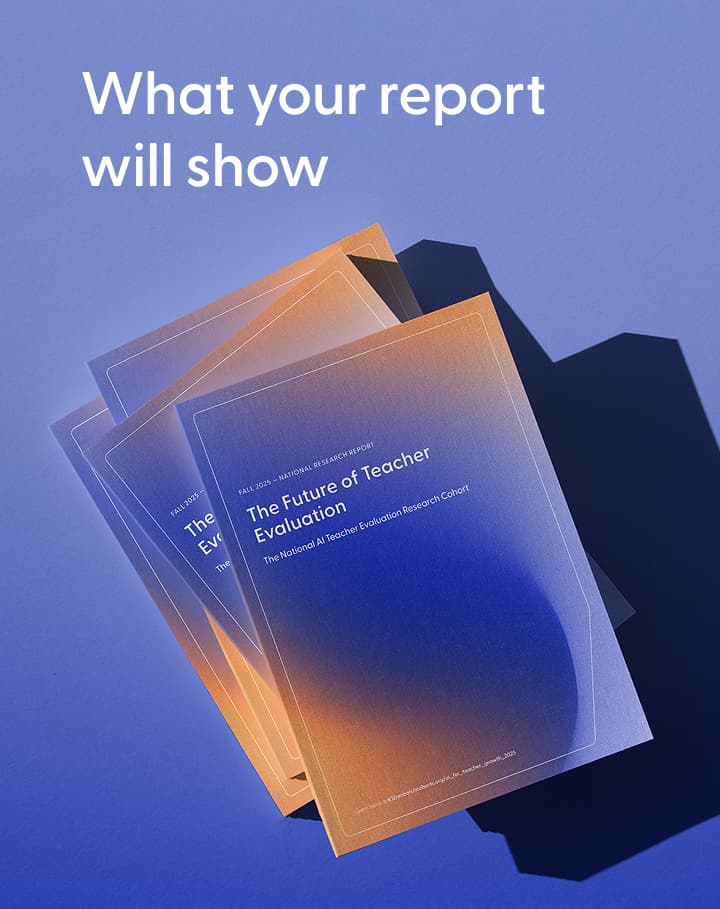National cohort now open:
Reimagining teacher evaluation



Join 100 districts shaping the future of teacher development — with evidence your schools and community can trust.
Enrollment closes October 28, 2025.
Can emerging AI tools help leaders work more efficiently, rebuild trust, and create the conditions for growth, not compliance? Or are these new tools simply part of the problem?










Join 100 districts to find out.
How it works
Enroll by Oct. 28, 2025 — fall cohort limited to 30 districts.
Select a focus school or group of classrooms.
Join onboarding and focus groups.
Access the platform and participate in cohort sessions.
Receive interim findings and final report with personalized results review.
How it works
Enroll by Oct. 28, 2025 — fall cohort limited to 30 districts.
Select a focus school or group of classrooms.
Join onboarding and focus groups.
Access the platform and participate in cohort sessions.
Receive interim findings and final report with personalized results review.
The experience
Cohort participants are invited to participate in (4) collaborative, structured learning sessions. Each session explores one the study's key metrics or subgroup focus areas, with the goal of helping participants explore the benefits and potential drawbacks of AI in the teacher evaluation process. After the cohort concludes, each district will receive a personalized results review meeting (January–April 2026), designed to help their districts turn the research into actionable next steps.
Session 1
Teacher growth (TG): Building better feedback for real growth
Understand how higher-quality, context-driven evaluation feedback supports professional learning. Examine examples that connect evaluation evidence directly to coaching and PD investments. Explore early signals of growth across districts and subject areas.
Session 2
Principal performance & efficiency (PPE): giving leaders time back
Analyze where principals spend their time and identify common bottlenecks. Explore how AI converts low-inference notes into standards-aligned evaluations. Test-drive Swiftscore workflows while capturing data on time-savings and usability.
Session 3
Relational trust (RT): Strengthening teacher–leader connection
Discuss how evaluation processes shape teacher perceptions of fairness and respect. Identify the trust signals that matter most (tone, clarity, follow-through). Evaluate whether AI-supported feedback can increase transparency and relational trust.
Session 4
Focus area subgroups: Shaping the future of AI in schools
Participants split into subgroups based on their chosen focus area (e.g., IEPs & Special Education, PD Alignment, Framework Implementation, Legacy Software, Regional Networks). Surface district-specific challenges and opportunities. Provide structured input into how AI can evolv...
Post-cohort
1:1 Report results & review meeting
Representatives from each participating district will receive a personalized results review — virtual or in-person — where participants can review composite scores and results (TG, PPE, RT), explore specific subgroup findings, and plan next steps.
Session 1
Teacher growth (TG): Building better feedback for real growth
Understand how higher-quality, context-driven evaluation feedback supports professional learning. Examine examples that connect evaluation evidence directly to coaching and PD investments. Explore early signals of growth across districts and subject areas.
Session 2
Principal performance & efficiency (PPE): giving leaders time back
Analyze where principals spend their time and identify common bottlenecks. Explore how AI converts low-inference notes into standards-aligned evaluations. Test-drive Swiftscore workflows while capturing data on time-savings and usability.
Session 3
Relational trust (RT): Strengthening teacher–leader connection
Discuss how evaluation processes shape teacher perceptions of fairness and respect. Identify the trust signals that matter most (tone, clarity, follow-through). Evaluate whether AI-supported feedback can increase transparency and relational trust.
Session 4
Focus area subgroups: Shaping the future of AI in schools
Participants split into subgroups based on their chosen focus area (e.g., IEPs & Special Education, PD Alignment, Framework Implementation, Legacy Software, Regional Networks). Surface district-specific challenges and opportunities. Provide structured input into how AI can evolve to meet needs beyond teacher evaluation. Contribute to the national ...
Post-cohort
1:1 Report results & review meeting
Representatives from each participating district will receive a personalized results review — virtual or in-person — where participants can review composite scores and results (TG, PPE, RT), explore specific subgroup findings, and plan next steps.
The experience
Cohort participants are invited to participate in (4) collaborative, structured learning sessions.
Each session explores one the study's key metrics or subgroup focus areas, with the goal of helping participants explore the benefits and potential drawbacks of AI in the teacher evaluation process.
After the cohort concludes, each district will receive a personalized results review meeting (January–April 2026), designed to help their districts turn the research into actionable next steps.
Session 1
Teacher growth (TG): Building better feedback for real growth
Understand how higher-quality, context-driven evaluation feedback supports professional learning. Examine examples that connect evaluation evidence directly to coaching and PD investments. Explore early signals of growth across districts and subject areas.
Session 2
Principal performance & efficiency (PPE): giving leaders time back
Analyze where principals spend their time and identify common bottlenecks. Explore how AI converts low-inference notes into standards-aligned evaluations. Test-drive Swiftscore workflows while capturing data on time-savings and usability.
Session 3
Relational trust (RT): Strengthening teacher–leader connection
Discuss how evaluation processes shape teacher perceptions of fairness and respect. Identify the trust signals that matter most (tone, clarity, follow-through). Evaluate whether AI-supported feedback can increase transparency and relational trust.
Session 4
Focus area subgroups: Shaping the future of AI in schools
Participants split into subgroups based on their chosen focus area (e.g., IEPs & Special Education, PD Alignment, Framework Implementation, Legacy Software, Regional Networks). Surface district-specific challenges and opportunities. Provide structured input into how AI can evolv...
Post-cohort
1:1 Report results & review meeting
Representatives from each participating district will receive a personalized results review — virtual or in-person — where participants can review composite scores and results (TG, PPE, RT), explore specific subgroup findings, and plan next steps.
Session 1
Teacher growth (TG): Building better feedback for real growth
Understand how higher-quality, context-driven evaluation feedback supports professional learning. Examine examples that connect evaluation evidence directly to coaching and PD investments. Explore early signals of growth across districts and subject areas.
Session 2
Principal performance & efficiency (PPE): giving leaders time back
Analyze where principals spend their time and identify common bottlenecks. Explore how AI converts low-inference notes into standards-aligned evaluations. Test-drive Swiftscore workflows while capturing data on time-savings and usability.
Session 3
Relational trust (RT): Strengthening teacher–leader connection
Discuss how evaluation processes shape teacher perceptions of fairness and respect. Identify the trust signals that matter most (tone, clarity, follow-through). Evaluate whether AI-supported feedback can increase transparency and relational trust.
Session 4
Focus area subgroups: Shaping the future of AI in schools
Participants split into subgroups based on their chosen focus area (e.g., IEPs & Special Education, PD Alignment, Framework Implementation, Legacy Software, Regional Networks). Surface district-specific challenges and opportunities. Provide structured input into how AI can evolve to meet needs beyond teacher evaluation. Contribute to the national ...
Post-cohort
1:1 Report results & review meeting
Representatives from each participating district will receive a personalized results review — virtual or in-person — where participants can review composite scores and results (TG, PPE, RT), explore specific subgroup findings, and plan next steps.
What you'll get
Research-backed AI adoption
Cut through the noise of vendor pilots by joining a structured, evidence-driven study.
Receive actionable research outputs
Emerge with a full report featuring national, regional, and district-specific findings - evidence you can present with confidence to your board and community., evidence-driven study.
Collaborate with peers
Work alongside other district leaders tackling the same challenges of efficiency, trust, and growth.
Shape the national conversation
Contribute to how AI can be used: not as a simple time-saver, but as a tool for connection and impact.
Test-drive an emerging tool
Every district receives access to Swiftscore's AI-powered teacher evaluation platform. Reduce evaluation time, deepen coaching, and see how technology can return educators to the work they came to do.
What you'll get
Research-backed AI adoption
Cut through the noise of vendor pilots by joining a structured, evidence-driven study.
Receive actionable research outputs
Emerge with a full report featuring national, regional, and district-specific findings - evidence you can present with confidence to your board and community., evidence-driven study.
Collaborate with peers
Work alongside other district leaders tackling the same challenges of efficiency, trust, and growth.
Shape the national conversation
Contribute to how AI can be used: not as a simple time-saver, but as a tool for connection and impact.
Test-drive an emerging tool
Every district receives access to Swiftscore's AI-powered teacher evaluation platform. Reduce evaluation time, deepen coaching, and see how technology can return educators to the work they came to do.

Each participating district receives:
Composite findings for Principal Performance & Efficiency (PPE), Relational Trust (RT), and Teacher Growth (TG).
PPE: Efficiency that gives leaders time back to lead.
RT: Trust that restores connection between principals and teachers.
TG: Growth that reignites the purpose of teaching.
Sub-metrics detailing efficiency, reliability, fairness, and coaching impact.
Comparative insights against traditional evaluation processes, general AI tools (ChatGPT, Claude, etc.), and legacy software platforms.
Clear data points tied to your selected focus area.

Each participating district receives:
Composite findings for Principal Performance & Efficiency (PPE), Relational Trust (RT), and Teacher Growth (TG).
PPE: Efficiency that gives leaders time back to lead.
RT: Trust that restores connection between principals and teachers.
TG: Growth that reignites the purpose of teaching.
Sub-metrics detailing efficiency, reliability, fairness, and coaching impact.
Comparative insights against traditional evaluation processes, general AI tools (ChatGPT, Claude, etc.), and legacy software platforms.
Clear data points tied to your selected focus area.

Funding & eligibility
Enrollment deadline: Dec. 1, 2025 — one week prior to cohort launch
Participation can be supported through:
IEP and Special education budgets
Title II and Title IV funds
Professional development budgets
Innovation or AI-specific grants
Regional service center allocations

Funding & eligibility
Enrollment deadline: Dec. 1, 2025 — one week prior to cohort launch
Participation can be supported through:
IEP and Special education budgets
Title II and Title IV funds
Professional development budgets
Innovation or AI-specific grants
Regional service center allocations
Be one of just 30 districts nationwide to join Cohort 1 of this groundbreaking study.
Lead with evidence. Rebuild trust. Give your educators the freedom to grow.
Be one of just 30 districts nationwide to join Cohort 1 of this groundbreaking study.
Lead with evidence. Rebuild trust. Give your educators the freedom to grow.
Streamline teacher evaluation with AI-powered leadership
Learn more about Swiftscore

